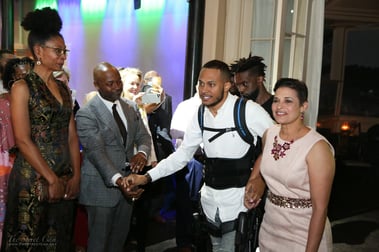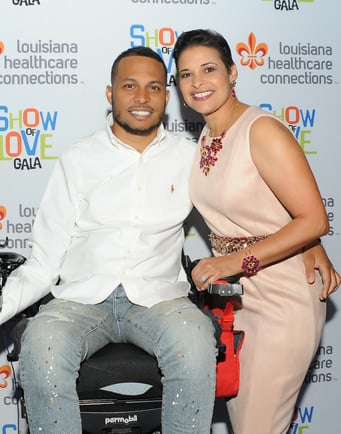Community Spotlight: Mark Raymond Jr.
Join Our Movement
What started as an idea has become a national movement. With your support, we can influence policy and inspire lasting change.
Become an Advocate
In April 2018, Raymond founded the Split Second Foundation. Its main goal was to make people aware of this sometimes-invisible population by advocating for their rights, funding cutting edge research, and providing clear-cut steps to immediately impact their lives.
Three years later, in 2021, Raymond opened Split Second Fitness, the first gym in Louisiana designed to exclusively serve people living with paralysis, amputation, or other neurological conditions.
 Split Second Fitness members are initially assessed by staff, who evaluate their strengths, weaknesses, and deficits. Clients then receive an individualized regimen using exercises and treatments developed through activity-based therapy programs. Membership is not covered by insurance, but fees are nominal; most of the program is subsidized by the Foundation’s fundraising efforts.
Split Second Fitness members are initially assessed by staff, who evaluate their strengths, weaknesses, and deficits. Clients then receive an individualized regimen using exercises and treatments developed through activity-based therapy programs. Membership is not covered by insurance, but fees are nominal; most of the program is subsidized by the Foundation’s fundraising efforts.
Raymond is also determined to have an impact on increasing mobility options for people who are dependent on wheelchairs, scooters, and other assistive devices. New Orleans Mayor Latoya Cantrell recently appointed him Chairman of the Board of Commissioners for the Regional Transit Authority, which operates, maintains, and administers the public transportation service in New Orleans.
“There are very limited transit options or transportation options for people with mobility challenges here,” says Raymond. “Uber and Lyft do not have a wheelchair accessible service yet. So, people either have to go through private companies that charge outrageous prices, creating another huge barrier for people.”
One of Raymond’s goals is to push for legislation that would require Uber and Lyft as well as some of the taxicab companies, to have wheelchair accessible vehicles available. He also imagines a nationwide policy that would require the major rental car companies to have a small percentage of their fleet consist of wheelchair accessible vehicles.
“That's another huge issue for folks,” he says. “I can't fly to Washington DC and just go to Avis and get a wheelchair accessible vehicle, and not having that option is just a huge disservice to folks with mobility challenges and who use mobility devices to get around.”
Raymond credits the adversity he’s faced with turning him into an activist.
“The power of adversity has always pushed human evolution,” says Raymond. “Adversity is the first step in most societal evolutionary processes—it goes adversity, inspiration, innovation, technology, which leads to the future. I'm really hopeful for tomorrow for all people who live with paralysis or some type of disability.”
